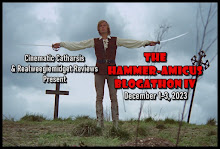 The Curse of the Werewolf
The Curse of the Werewolf was one of the first Hammer movies I ever saw at a tender age and that got me hooked on Hammer. I had watched it repeatedly over a couple of years, though admittedly this was a good while ago and it was more than time for a re-evaluation. Lately I had read about it being overrated and lacking in action, so when I finally put the disc into my player I was somewhat reluctant. Would I still feel the same about the film as in my youth? Or would it be yet another one of those memories that were better left untouched and simply kept as nostalgia.
I shouldn’t have worried.
Curse still satisfied my lycanthropic cravings and remains an excellent film.
What is quite obvious is its very distinct three act structure. Act 1: The scenes at Count Siniestro’s (Anthony Dawson) court, the incarceration of the beggar (Richard Wordsworth), the rape of
Yvonne Romain’s character and birth of Leon, the character doomed to become a Werewolf. Act 2: Leon’s childhood, the discovery that he is indeed a werewolf. Act 3: Leon as an adult played by Oliver Reed, his involuntary killing spree and final death.
Of those three acts the first and the last are by far the most memorable and horrific. The scenes of debauchery at the court, the humiliation and animalisation of the beggar and the rape of the mute servant girl still don't pull any punches. And the werewolf transformations and killings are classic iconic scenes. True, some may think that the second act may be dragging a bit, yet the scenes in it are ultimately essential in making us getting to like Leon and his family and thereby creating a more tragic climax.
Though it takes nearly an hour until Oliver Reed appears in his first proper starring role, he does give his all and it is a tremendous, haunting performance by the young actor that clearly put him on the map.
Interestingly enough we are not given the more traditional reasons for why the transformations occur. There is no other werewolf in the picture who may have bitten Leon or anyone else in his family. Instead any one of a number of possible reasons for his affliction are indicated: Was it the rape by someone who deteriorated to sub-human levels? Or the fact that the mother survived for months alone in the forest by living a quasi-animal life? Or because he was born out of wedlock on Christmas Day? Or maybe because he had to battle strong inner demons? This untraditional approach leaves a very satisfying mystique about the character.
The film was based on a novel by Guy Endore, The Werewolf of Paris, in which the action takes place in France whereas the Hammer adaptation transferred it to Spain.




























